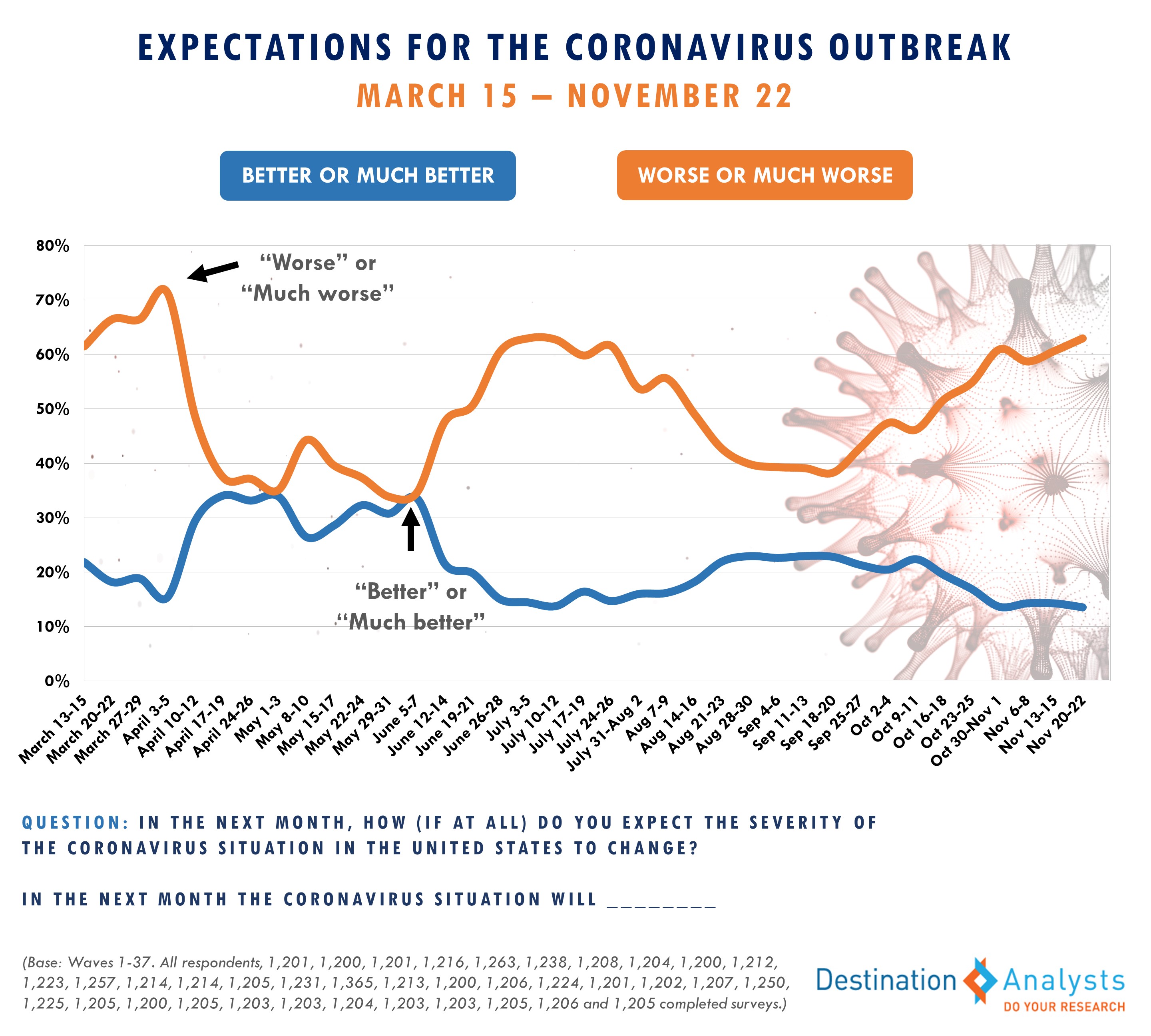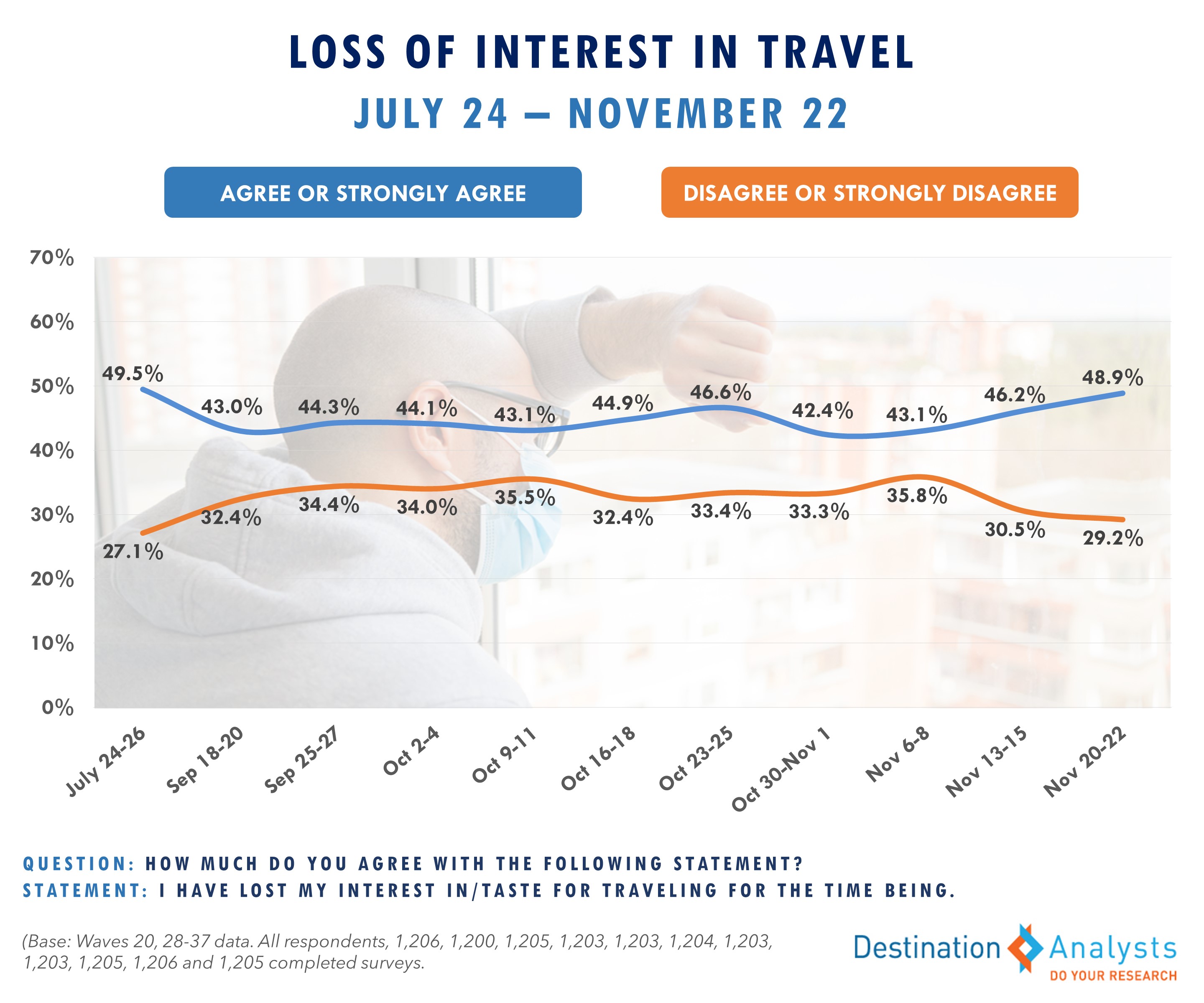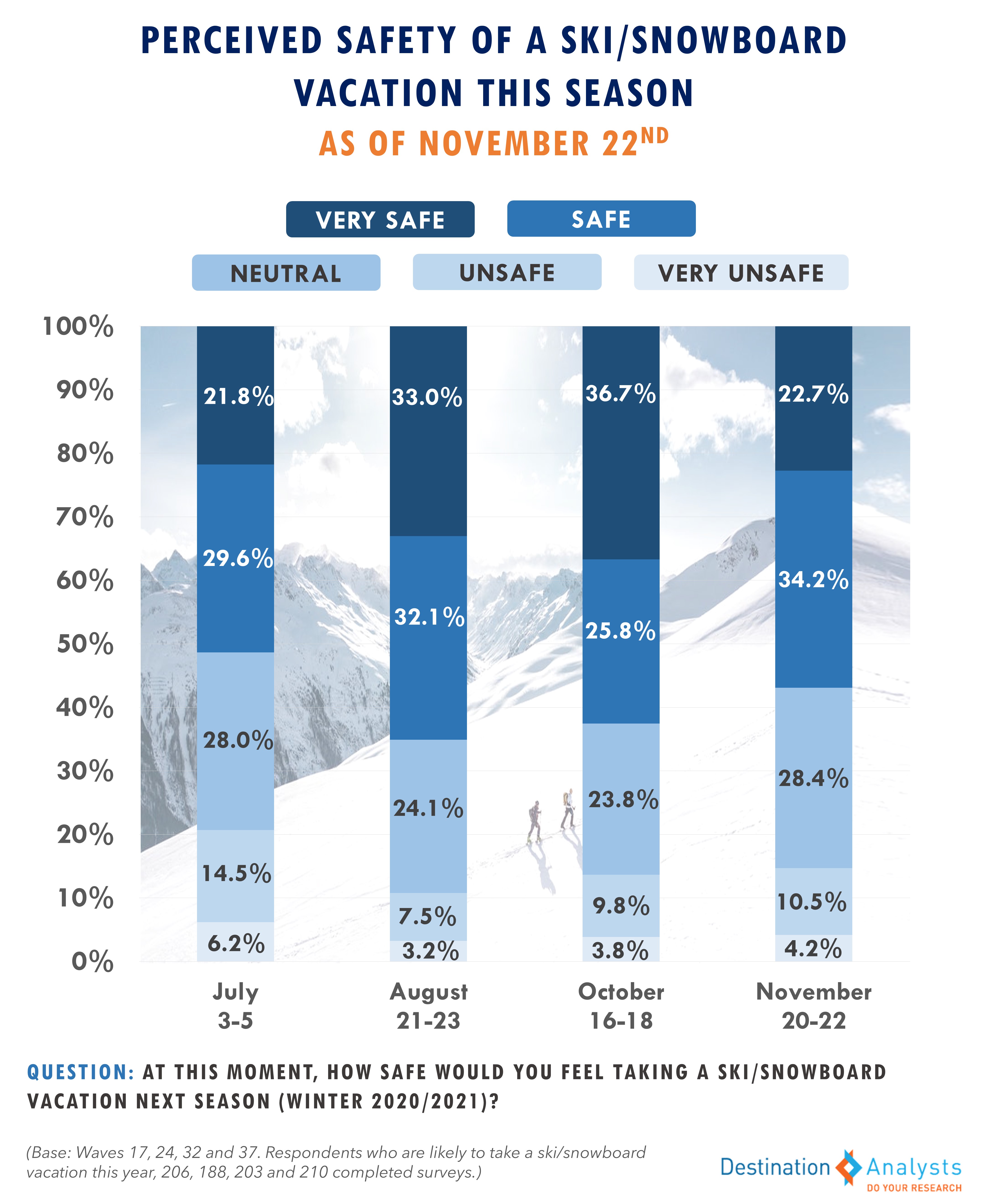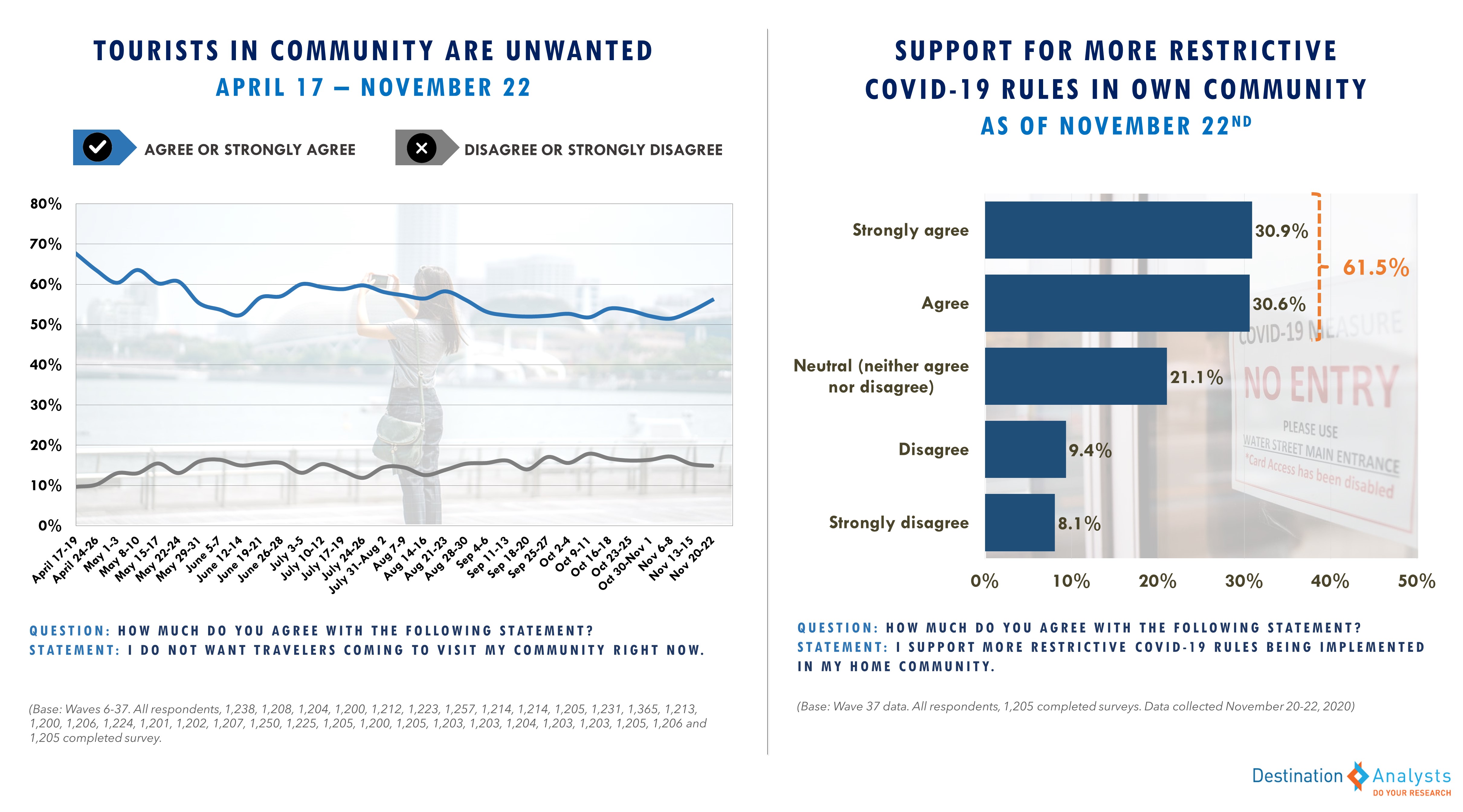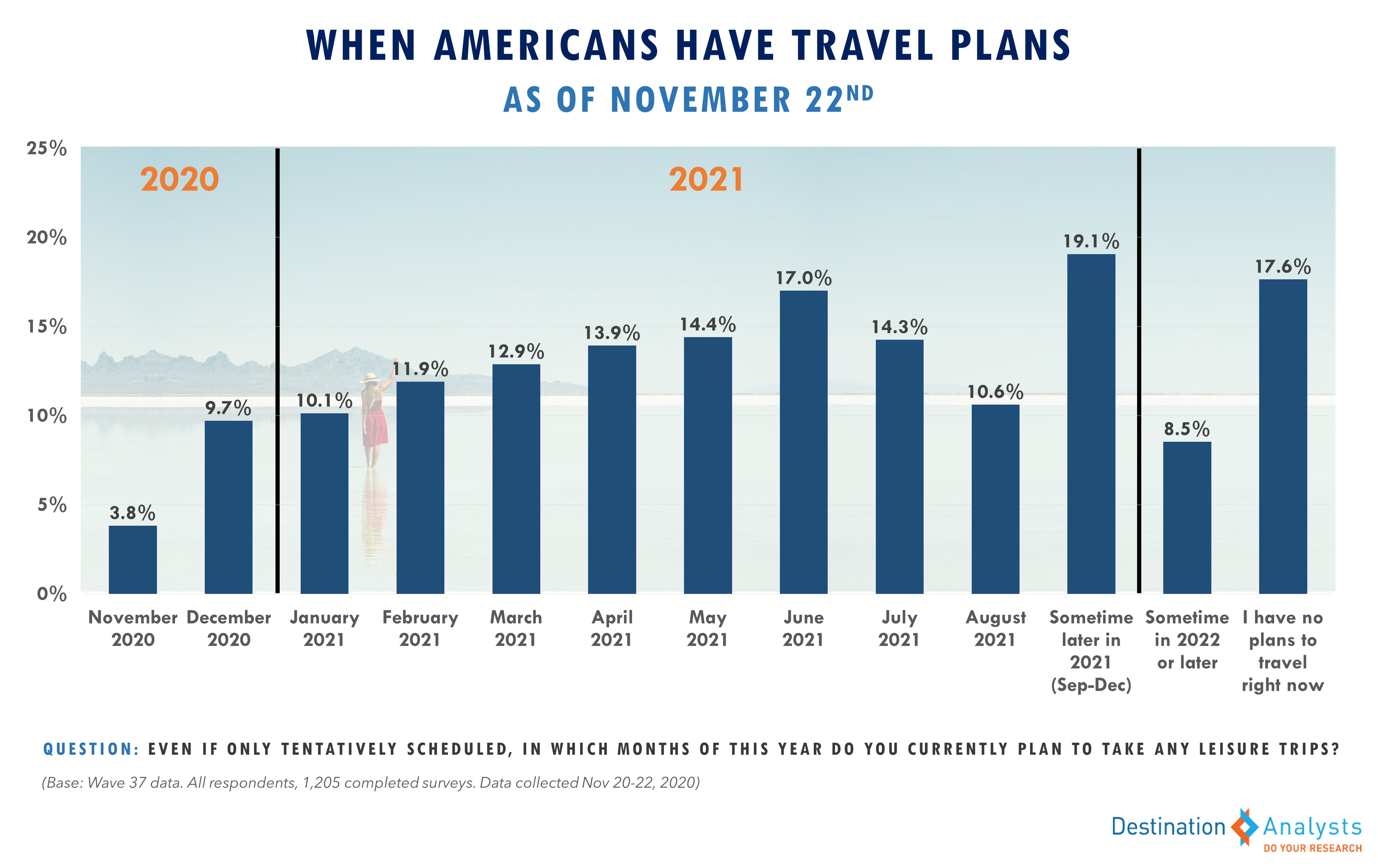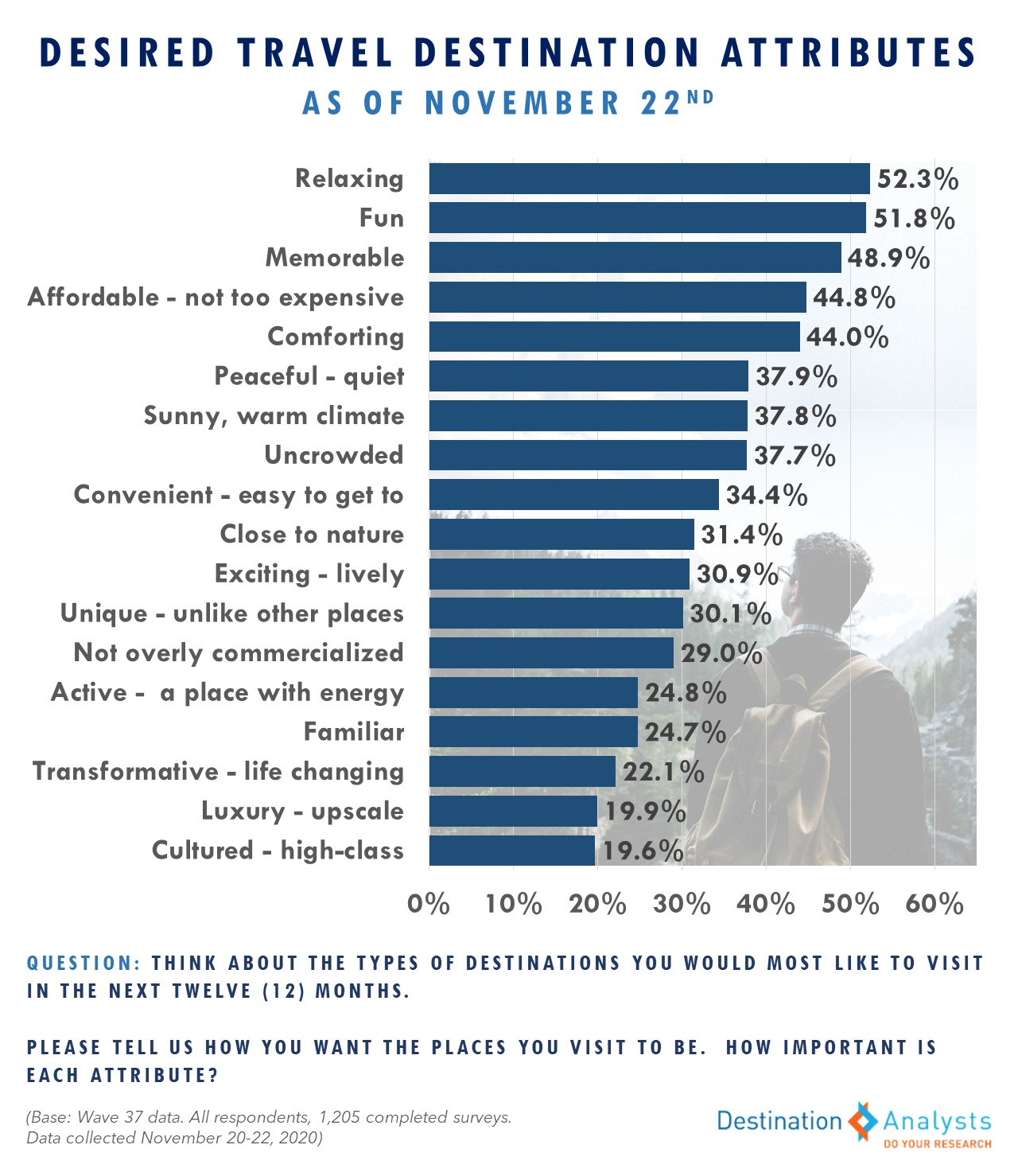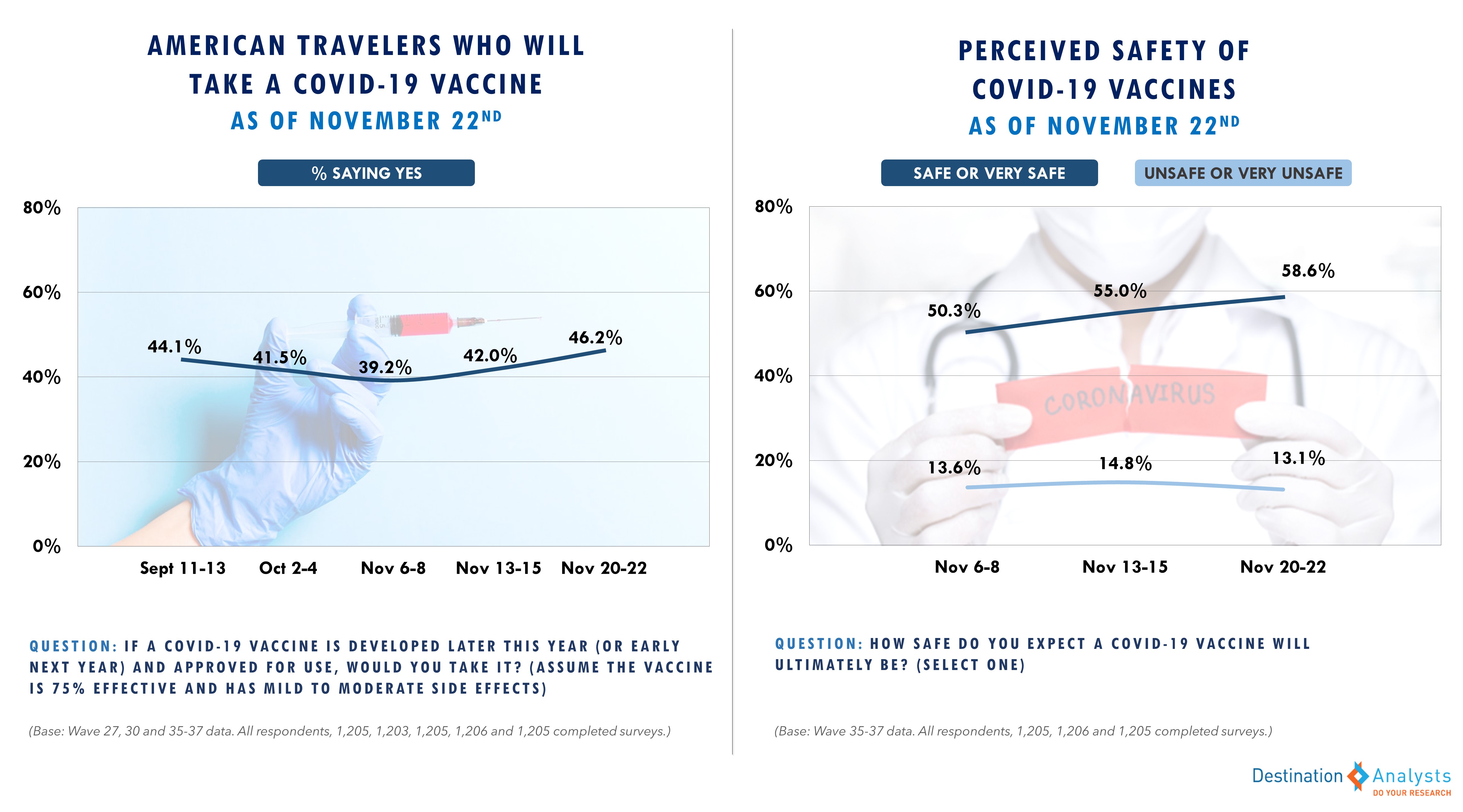Update on American Travel in the Period of Coronavirus—Week of November 23rd
As Americans head into Thanksgiving week—the fourth major travel holiday during this pandemic—record COVID-19 cases across the country continues to devastate sentiment about near-term travel and the industry’s ability to inspire new, incremental trips. However, there are indicators that the impact on travel may not be as deep or long-lasting as previous surges.

IMPORTANT: These findings are brought to you from our independent research, which is not sponsored, conducted or influenced by any advertising or marketing agency. Every week since March 15th, Destination Analysts has surveyed 1,200+ American travelers about their thoughts, feelings, perceptions and behaviors surrounding travel in the wake of the coronavirus pandemic, and explored a variety of topics. The findings presented below represent data collected November 20th-22nd.
Key Findings to Know:
- Anxiety about contracting the virus continues to rise. 62.9% feel things are going to get worse in the next month and only 13.5% feel it will get better.
- This continues to devastate sentiment about near-term travel and the industry’s ability to inspire new, incremental trips. 61.9% of American travelers continue to agree that the current surge in cases has made them less likely to travel in the next three months. The percent of Americans who agree they have lost their interest in travel for the time being is now approaching half.
- The poor course of the pandemic also appears to be affecting sentiment towards ski/snowboard travel this season. Fewer ski/snowboard travelers feel that a ski/snowboard trip is safe this 2020/2021 season than did in October. However, over two-thirds of these travelers say that the institution of pandemic protocols would make them more interested in taking a ski/snowboard trip this season.
- Nevertheless, there are indicators that the impacts of this current virus surge on travel may not be as deep or long-lasting as previous surges. The perception of travel activities as unsafe, engagement in travel avoidance overall, avoidance of international travel specifically and avoidance of conventions are still not near peaks hit in July and April.
- Looking locally, over 40% of Americans feel comfortable going out for leisure activities in their own communities. While 56.1% do not want tourists coming to their community right now, this sentiment is also not at July and April levels. Perhaps in a nod to lessons learned in previous stages of the pandemic, 61.5% agree they support more restrictive COVID-19 rules being implemented in their home community.
- Americans continue to report having trips planned over the next year (82%).
- As they look to where they want to travel to over the next year, Americans are most commonly reporting that relaxing, fun, memorable, affordable and comforting are important attributes in the destinations they consider.
- The latest vaccine news has made 58.1% of American travelers more optimistic about life returning to normal (or near normal) in the next six months.
- We wish you and yours a happy and safe Thanksgiving!
As Americans head into Thanksgiving week—the fourth major travel holiday during this pandemic—average daily coronavirus cases have spiked to more than two times what they were in July (during the previous summer surge in cases), and American deaths from COVID-19 cases surpassed a quarter of a million. Anxiety continues to rise, as 74.4% of Americans have a high degree of concern about their friends/family contracting the virus and 69.4% are highly concerned about contracting it themselves. Americans’ pessimism about the virus’ course in our country is now back at the level it was when we headed into the July Fourth weekend, with 62.9% feeling things are going to get worse in the next month and only 13.5% feeling it will get better.
This continues to devastate sentiment about near-term travel and the industry’s ability to inspire new, incremental trips. This week, 61.9% of American travelers continued to agree that the current surge in cases has made them less likely to travel in the next three months. The percent of Americans who agree they have lost their interest in travel for the time being is now approaching half—up 6 percentage points in the past month and at a level last seen in July. Six-in-ten American travelers continue to feel they would not be able to fully enjoy travel right now, and nearly 52% say they would feel guilty traveling, up 5 percentage points in a week. Americans’ state of mind around travel also took a dip after holding constant for the last two weeks, with those in a readiness mindset falling to 53.9%.
The poor course of the pandemic also appears to be affecting sentiment towards ski/snowboard travel this season. Fewer ski/snowboard travelers feel that a ski/snowboard trip is safe this 2020/2021 season than did in October (56.9% vs 62.5%). However, over two-thirds of these travelers say that pandemic protocols such as requiring guests to book their ski dates in advance and limiting the number of people allowed on the mountain make them more interested in taking a ski/snowboard trip this season.
Nevertheless, there are indicators that the impacts of this current virus surge on travel may not be as deep or long-lasting as previous surges. While the perception of travel activities as unsafe has crept up in the last two weeks (54.3%), it is still not near peaks hit in July (60.6%) and April (69.4%). Similarly, engaging in travel avoidance until the coronavirus situation is more resolved at 56.3%, not hitting prior surge peaks of 62.1% (July) and 82.8% (March). The avoidance of international travel specifically is at 75.2%, still a ways from how Americans were feeling in July (80.2%) and April (82.1%). Avoiding conventions and conferences is at one of the lowest points it’s been in the pandemic—falling below 70% for the first time since June 7th. Looking locally, over 40% of Americans feel comfortable going out for leisure activities in their own communities—more than twice the number than in the early stage of the pandemic. While 56.1% do not want tourists coming to their community right now, this sentiment is also not at July and April levels. Perhaps in a nod to lessons learned in previous stages of the pandemic, 61.5% agree they support more restrictive COVID-19 rules being implemented in their home community.
Americans continue to report having trips planned over the next year. In fact, over 82% have at least tentative plans for travel, with fully 17% saying they plan to take a trip at the start of summer 2021, in June.
As they look to where they want to travel to over the next year, Americans are most commonly reporting that relaxing, fun, memorable, affordable and comforting are important attributes in the destinations they consider.
The recent news about COVID-19 vaccines also has Americans feeling some optimism. While just 28.9% felt it was likely we would have a vaccine developed by the end of 2020 on November 8th, now 57.1% do. This week, 58.6% believe a vaccine that is developed will be safe (up from 50.3% at the beginning of the month) and 46.2% say they definitively would take a vaccine. The latest vaccine news has made 58.1% of American travelers more optimistic about life returning to normal (or near normal) in the next six months. Interestingly, with a COVID-19 vaccine looking more realistic for the near future, more Americans are saying they won’t travel without a vaccine–46.6%, up from 38.2% at the start of November.

